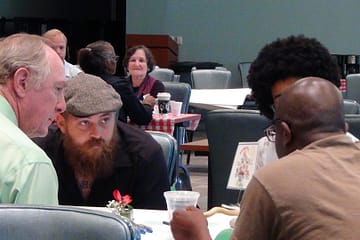FLORIDA RELIGIOUS LEADERS’ STATEMENT ON GLOBAL CLIMATE CHANGE (1998)
We, members of the Florida Faith Community, greet you, our sisters and brothers, on behalf of God’s creation. We who are dedicated to the health and habitat of our own good state are also citizens of the whole of Creation. Scripture tells us that all creation is good and that human beings are given the responsibility to care for all of God’s creation.1 Our kinship with creation elicits a response of awe and responsibility-awe for the sacredness and delicate interconnectedness of life, and responsibility for the preservation and protection of creation.
We believe that global warming with associated climate changes is an inescapable spiritual challenge, dramatically reminding us of the call by God to faithful stewardship. Average global temperature has increased more than one degree F since 1900, and the last three years have been the warmest since records have been kept. Although climate changes have occurred in the past due to natural causes, scientists concur that the rate of recent warming is due largely to human activity.
The global warming is due to the increased presence in the atmosphere of gases that reflect radiation back to the earth, instead of letting it escape into space. The most abundant of these “greenhouse gases” is carbon dioxide. We have increased the amount of it in the atmosphere by 25% since 1900 2 by burning fossil fuels (oil, natural gas, coal) for energy, by cement manufacture, and by destroying forests through slash and bum methods. Other greenhouse gases that have been increased in the atmosphere by human activity are methane and gases used for refrigeration, and nitrogen oxides formed during combustion of fossil fuels.
Unless drastic changes in human activity are made, it is projected that atmospheric carbon dioxide will double by 2050, with a rise in global temperature of 2-6 degrees F, and greater warming over land areas at higher latitudes. Temperature will continue to rise after greenhouse gas concentrations stabilize, and these concentrations will not fall until long after emissions decline.
The results of such an increase in global warming will be an increase in sea level this century by 10-30 inches, with flooding of low-lying regions. There will be more frequent and severe heat waves and droughts in some regions, and heavier storms and floods in others. The rapidity of the climate changes will limit the ability of many plant and animal species to adapt.
Although the industrialized nations are the biggest contributors to global warming, the burden of these changes will fall disproportionately on the most vulnerable of the planet’s people: the poor, sick, elderly, and those who will face still greater threats in future generations. Concern for the environment and creation therefore include a constitutive call for justice. Climate change and air pollution violate moral and religious principles of peace and justice. Materialism, excessive consumption, irresponsible lifestyle choices and mal-distribution of resources are issues at the core of this debate. Our society cannot afford to neglect the impact these issues have on building a peaceful and equitable quality of life for all people.
As people of faith whom God calls to be stewards of creation, we are eager to join you in establishing the Florida Interfaith Global Warming Campaign. Each of us will have different ways to act on our resolve, but we will be eager to join in efforts to:
- Pray and consult scripture for the wisdom and strength to address human induced global climate change as a violation of God’s creation.
- Distribute educational materials, offer sermons and homilies, and convene study groups to help our congregations understand and embrace this challenge and take action to conserve energy and reduce excessive use of fossil fuels.
- Share religious perspectives on air pollution and global change with representatives of key sectors in our state-labor, business, agriculture and environmental organizations- seeking ways to work together for the common good.
- Organize our communities to meet with U.S. Representatives, Senators, and Florida legislators to share our support of domestic and international initiatives, to reduce global warming, particularly research for development of alternative renewable energy sources.
- Call on the President and Congress to raise fuel economy standards for all vehicles and transportation equipment.
- Call on Congress to reduce fossil fuel emissions from all electric power plants to reduce greenhouse gases and air pollution.
- Encourage the electric utility industry and other key energy-intensive industries to increase the use of renewable and clean energy sources.
- Call upon all oil companies to follow the lead of those companies, which have already pledged to reduce their greenhouse gas emissions and to invest in alternative energy sources.
- Encourage the development of transportation plans, which promote sustainability and protect and maintain community.
- Work toward climate policies and air pollution policies that assure a just transition to a full employment economy, which provides family-supporting jobs now and in the future.
- Declare our support for the ratification of the kinds of equitable measures envisioned by the 160 nations of the Kyoto Protocol, which calls for a 5% reduction in greenhouse gas emissions below the 1990 level.
We speak as people of faith seeking to be true to our responsibilities toward God’s creation. We understand that the issue of climate change is complex and has major political ramifications, but we believe that the discussion must be guided by the underlying fundamental imperatives:
Respect for all life and the dignity of the human person.
1 Genesis 1:3 1: – God saw all that God had made, and it was very good.
Quran 2:30: Behold, thy Lord said to the angels: “I will create a vicegerent on earth.” The perfect vicegerent, ambassador, and the representative of God on the Earth (the man) has a great responsibility among many to protect God’s creation.
2 Intergovernmental Panel on Climate Change, Second Assessment Report: Climate Change 1995.
